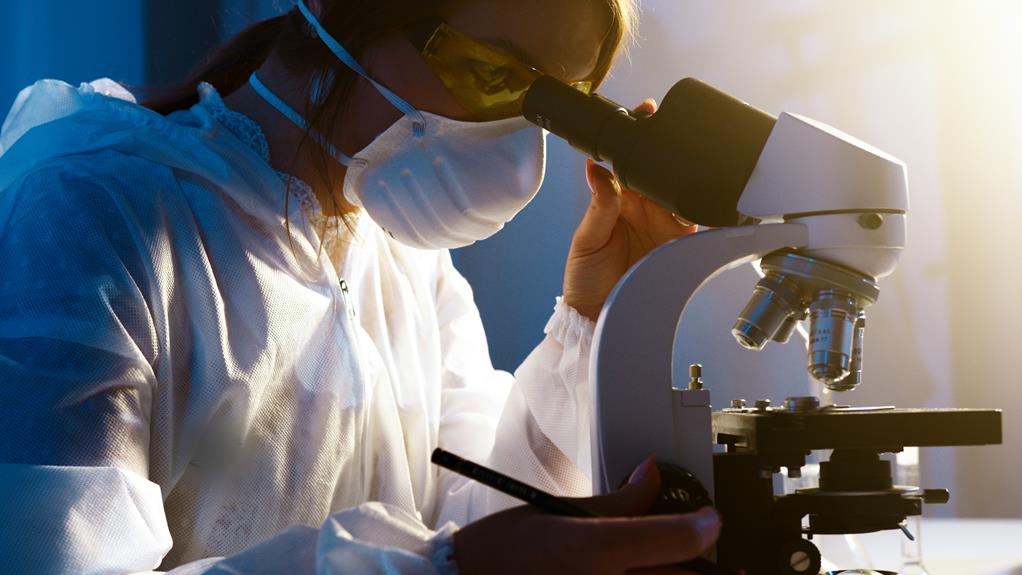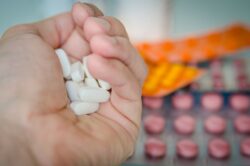Food and Drug Administration (FDA)
As the gatekeeper of public health, the Food and Drug Administration (FDA) holds a pivotal role in the United States. This federal agency, residing under the Department of Health and Human Services, diligently regulates the safety and efficacy of health-related products ranging from drugs to food. Its extensive purview, fast-track programs, and involvement in countering global health crises underscore the FDA's critical contribution to safeguarding public health.

Key Takeaways
- The FDA regulates the selling of misbranded food and drugs and approves and regulates medical devices and pharmaceuticals.
- The FDA collects reports of adverse events and supervises drug, device, and vaccine recalls.
- Drugwatch.com is a reliable source of information, connecting injured individuals with law firms and providing experienced medical writers and journalists.
- The FDA is responsible for ensuring the safety and effectiveness of drugs, devices, vaccines, and food, and also regulates the manufacturing, marketing, and distribution of tobacco products.
Understanding the Role of the FDA
The Food and Drug Administration's primary role encompasses the regulation and supervision of food safety, pharmaceutical drugs, medical devices, and other health-related products in the United States. A key aspect of this role is the FDA's involvement in clinical trial regulations. The FDA reviews and approves protocols for clinical trials, ensuring the safety and rights of participants while assessing the scientific validity of the trials. It supervises the phases of trials to validate the safety and efficacy of pharmaceutical drugs and medical devices. Post-market surveillance is another critical responsibility of the FDA. After a product's approval, the FDA continues to monitor its safety and effectiveness in the larger public, ready to take action if adverse events or issues arise.
The Structure of the FDA
Within the United States Department of Health and Human Services, the FDA operates as a federal agency and is structured into five distinct offices, each carrying out specific roles and responsibilities. The FDA's organizational structure includes the Office of the Commissioner, the Office of Operations, the Office of Medical Products and Tobacco, the Office of Foods and Veterinary Medicine, and the Office of Global Regulatory Operations and Policy. Each office plays a key role in ensuring public health and safety. Among the FDA's numerous responsibilities, its role in drug safety monitoring is paramount. This involves the review of drugs before they are marketed, monitoring their safety once on the market, and taking action against any products that pose a risk to public health.
FDA’s Regulatory Scope
As a pivotal agency, the FDA oversees a broad range of sectors, including food, drugs, cosmetics, and medical devices, and it also regulates the manufacturing, marketing, and distribution of tobacco products. A significant part of FDA's regulatory enforcement involves the scrutiny of these sectors to ensure the safety, efficacy, and security of products. This extends to the inspection of production facilities, the evaluation of product labels, and the monitoring of product effects post-marketing. Integral to this is FDA's role in drug safety monitoring, which involves the continuous observation of drug performance, the investigation of adverse event reports, and the initiation of necessary recalls. Through these efforts, the FDA upholds its mandate to protect public health.
FDA’s Involvement in Drug Approval
Both comprehensive and critical, the involvement of the FDA in drug approval encompasses numerous stages, ranging from preclinical testing to post-marketing surveillance, ensuring that all drugs available to the public are safe and effective. This process epitomizes the FDA's role in drug safety. Through rigorous scientific evaluation, the FDA scrutinizes each drug's safety profile, benefits, and risks. Concurrently, the FDA's involvement in drug research and development is pivotal. The agency oversees clinical trials, ensuring ethical and scientific integrity. Post-approval, the FDA continues surveillance to detect and respond to any adverse effects, ensuring ongoing safety. This multifaceted role underscores the FDA's commitment to protect public health by assuring the safety, efficacy, and security of drugs.
Fast Track Programs of the FDA
In the realm of drug approval, the FDA utilizes Fast Track Programs to expedite the process for important new drugs, and this approach is particularly beneficial for treatments that address unmet medical needs. The FDA fast track programs are designed to facilitate the development and expedite the review of drugs intended to treat serious conditions and fill an unmet medical need. The goal is to ensure that therapies for serious conditions are approved and available to patients as soon as it can be concluded that the therapies' benefits justify their risks. This highlights the FDA's commitment to patient-centric drug development. The FDA drug approval process via fast track programs underscores the agency's commitment to bringing effective treatments to patients as quickly as possible.
Impact of FDA on Public Health
The Food and Drug Administration plays a pivotal role in safeguarding public health, and its rigorous regulations and oversight are instrumental in ensuring the safety, efficacy, and security of drugs, medical devices, and our food supply. The FDA's response to public health emergencies is swift and decisive, often involving the fast-track approval of necessary medical interventions. In addition to regulation and intervention, the FDA's role in consumer education and awareness is significant. The agency provides comprehensive, accessible information to the public about food and drug safety, enabling informed decision-making. Through these efforts, the FDA makes a substantial contribution to the prevention of disease, the promotion of public health, and the assurance of product safety.
FDA’s Role in Food Safety
Regulating food safety and ensuring the wellbeing of consumers, the FDA plays a critical part in the nation's health infrastructure. The FDA's role in food safety primarily involves the stringent regulation and surveillance of the production, sales, and distribution of food products. The agency works diligently to prevent foodborne illnesses, ensuring that the food supply is safe, sanitary, and properly labeled. Through regular inspections, enforcement actions, and science-based policy making, the FDA has a significant impact on public health. Their steadfast dedication to food safety helps protect consumers from the dangers of contaminated or mislabeled food products, ultimately benefiting the nation's overall health and wellness.
Medical Device Regulation by FDA
Under the jurisdiction of the FDA, medical devices, from pacemakers to insulin pumps, undergo rigorous evaluation for safety and efficacy, and the agency's oversight extends to both their manufacture and distribution. This FDA oversight on medical devices entails stringent pre-market scrutiny and post-market surveillance. In case of any identified risks or adverse effects, the FDA has the authority to enforce medical device recalls. This ensures that any potential harm to patients or end-users is mitigated. The FDA also maintains a publicly accessible database of reported device-related malfunctions, serious injuries, and deaths. This comprehensive regulation by the FDA ensures that all medical devices in the U.S. meet the highest standards of safety and efficacy.
FDA’s Role in Tobacco Control
Often, the FDA plays a crucial role in controlling tobacco use, and it maintains strict regulations on the manufacturing, marketing, and distribution of tobacco products. A key aspect of this is the FDA's role in e-cigarette regulation. The agency exercises oversight to ensure e-cigarettes are safe, effective, and correctly marketed. It also works to reduce the appeal of these products to underage users. Furthermore, the FDA is committed to reducing tobacco-related health disparities. It does so by enforcing rules that prevent targeted marketing to vulnerable groups and by promoting public health campaigns. Together, these measures underscore the FDA's pivotal role in protecting public health against the risks posed by tobacco and e-cigarette use.
The FDA and Cosmetics Industry
Within the scope of its numerous responsibilities, the FDA also plays a pivotal role in overseeing the cosmetics industry to ensure product safety and proper labeling. This involves implementing FDA regulation on cosmetic ingredients, which stipulates the use of safe substances and prohibits the inclusion of harmful compounds. The FDA's role in consumer product safety is further highlighted as it conducts thorough evaluations of cosmetic products before they hit the market. This ensures that the products don't pose health risks to consumers. In cases where safety issues arise post-market, the FDA takes necessary actions, including issuing recalls. These measures underscore the FDA's commitment to maintaining high safety standards in the cosmetics industry.
FDA’s Impact on Veterinary Medicine
Regulating the development and approval of animal drugs, the FDA has a significant impact on veterinary medicine, ensuring safety and efficacy for the treatment of various animal diseases. Notably, the FDA's role in veterinary drug regulation spans from the testing phase to the market release, and even post-market surveillance. This regulatory oversight guarantees that drugs used in the treatment of animals are both safe and effective. Moreover, the FDA's impact on veterinary research is substantial. By setting the standards for clinical trials in animals, the FDA ensures that new therapies are thoroughly evaluated before they become available on the market. This rigorous process guarantees that advancements in veterinary medicine are based on sound scientific research, benefiting both animal health and public health.
Biologics and the FDA
In the realm of public health regulation, the FDA plays a pivotal role in the approval and oversight of biologics, which include a wide range of products such as vaccines, blood components, allergenics, somatic cells, gene therapy, tissues, and recombinant therapeutic proteins. The FDA's regulation of biologics is integral to ensuring the safety and effectiveness of these products. They achieve this through rigorous testing, inspection of manufacturing processes, and continuous monitoring for adverse events post-approval. The FDA's role in drug safety monitoring is particularly crucial for biologics due to their complexity and potential for severe adverse reactions. Through constant oversight, the FDA maintains the highest standards of safety and efficacy for biologics, thereby protecting public health.
FDA’s Role in Countering Bioterrorism and Pandemics
Amidst the threats of bioterrorism and global pandemics, the Food and Drug Administration (FDA) assumes a critical role in safeguarding public health by ensuring the safety, efficacy, and security of drugs, vaccines, and other biological products. The FDA's role in countering bioterrorism involves proactive measures to detect, respond to, and recover from biological threats. This includes facilitating the development and availability of medical countermeasures such as vaccines, therapeutic drugs, and diagnostic tools. In response to public health emergencies like pandemics, the FDA expedites the review and approval process for drugs and vaccines, while maintaining the highest standards of safety and effectiveness. In essence, the FDA is a crucial pillar of the nation's defense against bioterrorism and pandemic threats.
FDA’s Global Influence and Collaboration
How does the FDA extend its influence beyond U.S. borders, and what role does international collaboration play in its mission to ensure public health and safety? FDA's global collaborations are key to its international reach. The agency works with foreign counterparts and global organizations to harmonize regulatory standards, conduct inspections, and respond to public health emergencies. This exchange of knowledge and resources boosts FDA's role in international drug regulation. It reviews and approves drugs developed abroad for U.S. market, ensuring they meet the same safety and efficacy standards as those produced domestically. Thus, the FDA's influence extends globally, helping set high benchmarks for drug regulation worldwide, ensuring the safety of imported products, and contributing to global public health.
Future Challenges and Opportunities for the FDA
Undoubtedly, the FDA faces a dynamic landscape of future challenges and opportunities, shaped by rapid advancements in technology, evolving public health concerns, and the expanding scope of global pharmaceutical markets. One of the major future challenges includes integrating technological and regulatory advancements whilst ensuring the safety and effectiveness of emerging medical products. The agency must adeptly navigate the intersection of technology and medicine, where innovations like artificial intelligence, genetic therapies, and digital health solutions are transforming healthcare. Additionally, the FDA must address public health crises like opioid abuse and antimicrobial resistance, requiring innovative regulatory approaches. The agency's ability to adapt its practices and policies to these challenges will greatly impact its role in protecting public health and fostering medical innovation.
Frequently Asked Questions
How Does the FDA Handle Conflicts of Interest Within Its Organization?
To manage conflicts of interest within its organization, a rigorous conflict resolution process is employed. This involves comprehensive ethical training for all members to ensure unbiased decision-making. Systems are in place to identify potential conflicts, followed by an evaluation and mitigation process. The objective is to maintain transparency and uphold the organization's reputation for integrity, thereby ensuring that all decisions are made in the best interest of public health.
What Are the Qualifications Required for Someone to Become an FDA Reviewer?
To become a reviewer, certain qualifications are essential. Candidates must have a strong scientific background, usually evidenced by an advanced degree in a relevant field. Experience in regulatory affairs or related areas is also beneficial. The Reviewer Recruitment Process seeks individuals with these qualifications. Once hired, reviewers undergo extensive training through Reviewer Training Programs, ensuring they are equipped to evaluate the safety and efficacy of products under their purview.
How Are FDA Regulations Enforced and What Are the Penalties for Non-Compliance?
Regulation impact and compliance challenges form a critical part of enforcement of standards. Non-compliance with regulations often results in penalties including fines, sanctions, or even business closure. Enforcement methods include routine inspections, audits, and investigations. The severity of penalties depends on the extent of non-compliance, potential harm caused, and if it's a repeat offense. Therefore, adherence to regulations is crucial to avoid detrimental consequences and maintain a reputable business standing.
How Does the FDA Interact With Other Governmental Agencies and Private Companies?
The interaction between various governmental agencies and private companies often involves inter-agency synergy and external collaboration. This form of synergy allows for shared knowledge and resources, aiding in effective decision-making and enforcement of regulations. Collaboration with private companies is vital in ensuring compliance with set standards and fostering innovation. This interplay ensures consumer safety, regulates product marketing, and encourages advancements in healthcare, among other sectors.
How Does the FDA Fund Its Operations and Is It Influenced by External Funding Sources?
The funding of an entity like the FDA hinges on a process known as the FDA Budgeting Process. This involves allocations from the federal budget, user fees from industries it oversees, and in some cases, funding from external sources. The question of influence from such external sources, particularly pharmaceutical companies, is a complex issue. While the FDA maintains its independence, concerns have been raised about potential biases due to reliance on industry funding for certain activities.
Conclusion
As the sentinel of public health, the FDA stands guard at the crossroads of innovation and safety. Its regulatory scope, encompassing drugs to devices and food, is a testament to its pivotal role. The agency's fast-track programs illuminate a pathway for accelerated medical breakthroughs, while its global influence echoes far beyond U.S. boundaries. Yet, as the future unfolds, the FDA must navigate an ocean of challenges and opportunities, steering the ship of public health towards the horizon of safety and efficacy.

This post has been generated by AI and was not reviewed by editors. This is Not legal advice. Please consult with an attorney.




